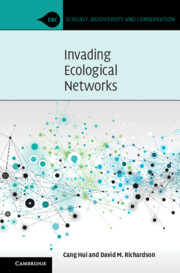Book contents
- Invading Ecological Networks
- Ecology, Biodiversity and Conservation
- Invading Ecological Networks
- Copyright page
- Epigraph
- Contents
- Preface
- Acknowledgements
- 1 Invasion Science 1.0
- 2 Relentless Evolution
- 3 Network Assembly
- 4 Regimes and Panarchy
- 5 Network Transitions
- 6 Network Scaling
- 7 Rethinking Invasibility
- Glossary
- Index
- Plate Section (PDF Only)
- References
2 - Relentless Evolution
Published online by Cambridge University Press: 05 May 2022
- Invading Ecological Networks
- Ecology, Biodiversity and Conservation
- Invading Ecological Networks
- Copyright page
- Epigraph
- Contents
- Preface
- Acknowledgements
- 1 Invasion Science 1.0
- 2 Relentless Evolution
- 3 Network Assembly
- 4 Regimes and Panarchy
- 5 Network Transitions
- 6 Network Scaling
- 7 Rethinking Invasibility
- Glossary
- Index
- Plate Section (PDF Only)
- References
Summary
This book deals with the roles and impacts of the entangled web of biotic interactions that an alien species partakes in as it infiltrates ecological networks. We partition related issues into six topics (network interactions, structures, stability, dynamics, scaling and invasibility). We start unpacking these issues here and will dive deeper into each in subsequent chapters. To embrace the complexity of ecological networks we need to introduce a few simple mathematical models and associated concepts that are fundamental to network analyses, visualisation and the ideas we develop. We keep the mathematical details to a minimum and provide intuitive explanation of their meaning and rationale; we also discuss, using simple terminology wherever possible, key procedures that lead to deductive conclusions. Most of the models we cite have been elucidated in great detail elsewhere and can be implemented in any computational language. Although we will not provide technical details, readers will be able to design their models and conduct analyses based on what is provided here to suit their own needs. Although we have tried to determine consensus views in the literature, the transdisciplinary nature of this field makes the knowledge landscape rugged and fluid. Answers are often not definite but contextualised. Let our journey begin.
- Type
- Chapter
- Information
- Invading Ecological Networks , pp. 50 - 108Publisher: Cambridge University PressPrint publication year: 2022

